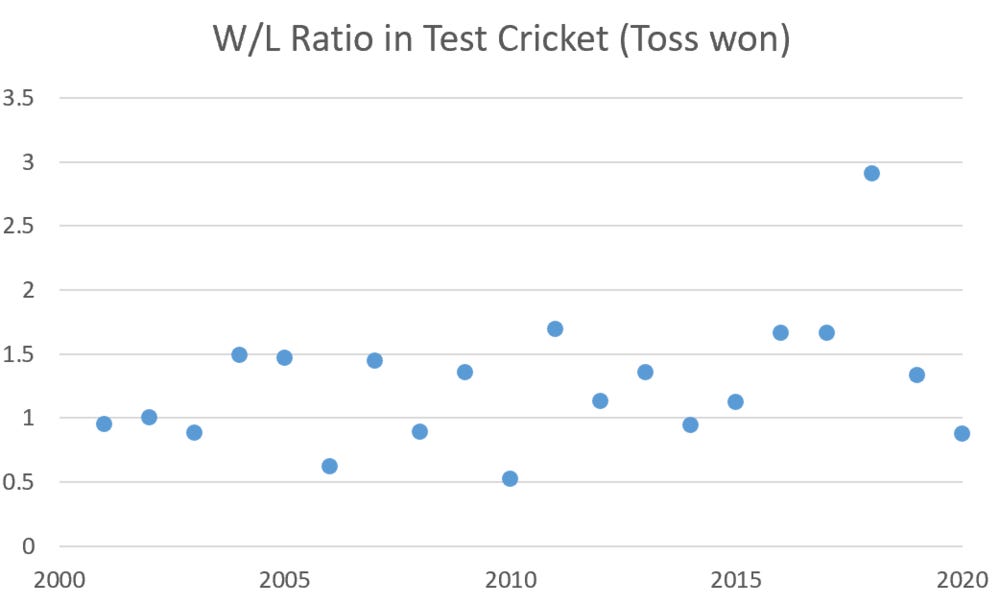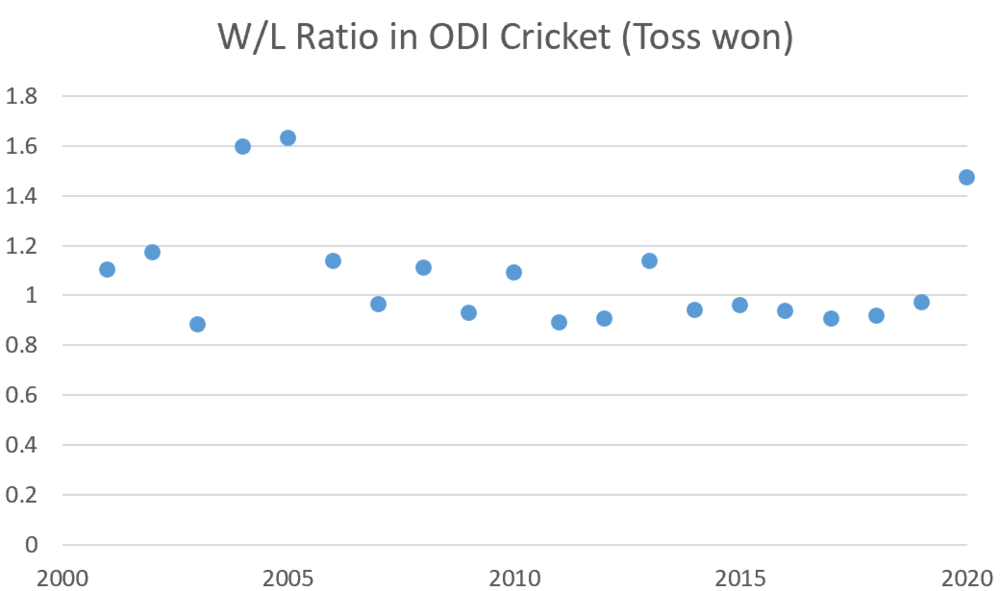The impact of the toss on test cricket and what can be done?
Luck plays an important role in every sport. Some sports are impacted by luck more than others due to a combination of pace, rules of the format, and duration of the tournament/series. In the US, March Madness is famous for producing more upsets than the NBA and a prime reason is that the number of games played is substantially less. Similarly in Cricket, Test cricket (being the 5-day format) is more likely to be decided on the basis of skill as compared to T20 cricket and yet, there is one aspect of luck that continues to play a big role in test cricket - that’s the toss.
Here’s some data around this:
In the last 20 years of test cricket, the W/L ratio for teams winning the toss has been greater than 1 in 12 of the 20 years. Since 2016, test cricket has been producing a lot fewer draws and (thanks to bowling-friendly pitches around the world) in these years, the W/L ratio for teams winning the toss has been around the 1.5 mark and it was in fact almost touched 3 in 2018. When we compare this to what’s happened in ODI cricket - the results are quite different. With the exception of 3 years (2004, 2005, and 2020), the W/L ratio for teams winning the toss has always been between 0.8 and 1.2 showing no clear benefits of winning the toss.
Anecdotally, you will often hear fans and occasionally commentators mention that winning the toss on an away tour is quite important to a team’s chances. I remember India’s tour of England in 2018, where all 5 games were won by the side that won the toss but most of those games were quite close. So it made me wonder - does the home side actually has a substantially better chance of winning the test if they win the toss?
Here’s what I found:
In 11 of the last 20 years - winning the toss at home pushes the W/L ratio for teams to 2 or over. In 6 of these years, it is 3 or higher. Even in 5 of the other 9 years have seen home teams winning at least 1.5 times more than loss when they win the toss. In case you are wondering about home teams winning the toss in ODIs - only in 3 of the last 20 years have they had W/L records of greater than 2. At this point - I wondered how much the W/L ratio for different teams improves at home when they win the toss.
While India is an exception, mostly thanks to their ridiculous record at home - almost all countries substantially improve their W/L record at home once they win their toss. In fact, New Zealand has won the toss in 18 home tests since 2011, won 11 and drawn 7. Additionally, it is well known that most good test teams of the last decades have become solid at home, making it quite challenging for visiting teams to win series. This can be confirmed by looking at the series won/lost since the start of 2011 for each team. Therefore, the combination of winning abroad being generally tough and the toss making it an even more uphill task - it is time we looked at the toss and tried to give visiting teams a better chance.
What is the alternative?
One suggestion is to remove the toss completely and allow the visiting team to choose what they would like to do. This would be a major change and eliminates any luck or surprise element. Additionally, weaker teams that tend to do better when they win the toss (especially at home) will be at a disadvantage with this suggestion.
Instead, a better suggestion I have come across (credit to @vishalmisra for mentioning this) is allowing the team that loses the toss to change their playing XI after the toss. Once the toss is done, the losing team could make a change (within the next 15-30 mins before play starts) and accommodate an extra batsman if the pitch is bowling friendly or add an extra bowler, if the pitch is quite flat.
Additionally, they would also have the advantage of knowing the playing XI of the team that won the toss, and therefore they could make changes if there are specific match-up they care about (example: pick off-spinner if the opposition has 5 lefties). While this doesn’t take luck completely out of the picture, it will certainly allow teams (particularly touring teams) to have a better chance to compete. Everyone from broadcasters to fans would agree that a better competition will only benefit the game in the longer run.








